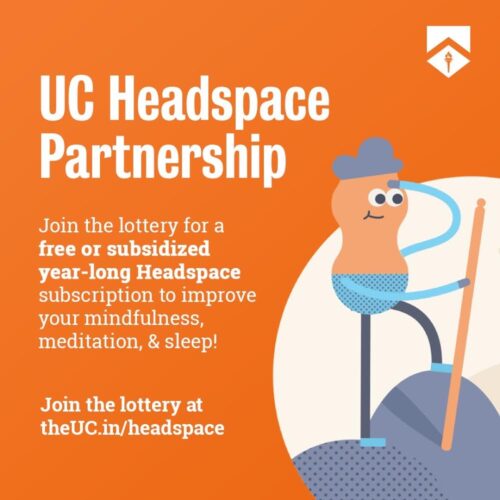HeadspUCe
The UC partners with Headspace to offer undergraduates a flexible mental health resource
By JEN EASON
We’ve all been receiving a lot of bad news lately. The best thing I’ve read this week was a meme about Toyota commercials. So, Noah Harris ’22, the Treasurer of the Harvard Undergraduate Council (UC), decided to bring us some good news—yes, even better than well-crafted memes. Given all the stress students are feeling around the current semester (well, with the Emergency SAT/UNSAT, maybe not so much; the average grade on my last Econ 1010a midterm was a 51…), the summer (bye bye, internships), and next semester (can I survive another semester at home?), Harris was looking for a way to provide support for students’ mental health. Harvard University Health Services is still providing mental health services through Behavioral Health and Counseling and Mental Health Services (CAMHS) via telemedicine, but, Harris recognized, it’s not the same, and it could be a full year before mental health resources are back to the way people are used to having them. He wanted to be able to supplement these services with something more dynamic.
Harris reached out to Headspace because he knew that the company had partnered with Boston University earlier this year to provide free Headspace (which regularly costs $69.99/year) to all BU staff and students until they graduate. He also found it attractive because it is “very campus-friendly and campus-minded.” They have meditations based around focus, productivity, stress, and work, among others. Live meditation classes occur every 30 minutes, so you never have to meditate alone: it’s meditation o’clock somewhere. “It allows students to learn a really valuable skill,” Harris says. When he saw this opportunity, he acted on it. As the treasurer, he is very familiar with the UC budget, so he can quickly gauge which projects will be within their means.
The initial plan is to lottery out 1,030 free subscriptions to students who apply. That is the minimum number of plans that Headspace will give at the student partnership price. This is where the UC is starting until they can get a better sense of what demand for the app will be. Preference will first be given to SEF-eligible students, those who receive significant amounts of financial aid from the College, and to the 600-800 students still living on campus. Harris acknowledges that being away from loved ones can be very tough during this stressful situation. From what he’s heard, those on campus will usually only be in contact with three other people a day, most of those people being food prep workers. If and when the first 1,030 completely free subscriptions run out, the app will be offered at a 90% discount for any other interested students. That will be $6.99 for a yearly subscription that usually rings up at $69.99. The free access to the app will begin on May 10, but the sign-up is already open now. The plan will last until May 10, 2021, but students can join at any point during the upcoming year.
Harris has so far been very impressed with the app, describing it as “exceptional.” Headspace gave UC members a free trial of their services so they could test it before sending it out to the student body. He has been impressed with the numerous podcasts, workouts, and meditations that the app has to offer. It’s a great way, he says, to “make sure that you’re valuing your mental health.” He also looked into partnering with similar apps, such as Calm, but appreciated that Headspace had plans for partnerships with colleges specifically and came at a better price. The app also has tools to let the UC track how many people are using their subscriptions, and Harris is reaching out to CAMHS to see how they can work together to track the mental health on campus. Headspace also has extensive scientific backing, claiming to be “the most evidence-based mental performance product on the market, with 23 published papers, 46 on the way.” The app’s features are also now available in Spanish, German, and French, in addition to English.
At the UC general meeting this past Sunday, March 3, the legislation passed to make the partnership official. And they have many other projects underway, as well. Members of the UC are working tirelessly to brainstorm contingency plans for the upcoming academic year, revising the grant process for student organizations in need of funding. Their work won’t be interrupted once the semester ends, as a constitutional amendment was passed that allows the UC to continue to collaborate in the summer if necessary should Harvard announce that the fall semester will be online. As part of this, they recently released their Student Experience & Opinion Survey to “help the administration to gauge student opinion, plan for the future, and inform future decisions.” It contains, “questions about leave of absence policy, grading policy, and your preferences for what the fall semester could look like.” Harris imagines the results will be “pretty interesting, and pretty useful.” It is also possible that the contentious, “optional” Student Activities Fee might not look the same come next semester, Harris says.
In addition to Headspace, the College is providing other online resources. You can visit the Behavioral Health website or the CAMHS website to make tele-appointments, or view their list of resources to use during quarantine. The Center for Wellness and Health Promotion and the Harvard Psychology department also have resources on their websites. And, if all else fails, you will definitely get some mood-boosting laughs out of scrolling through the memes on your explore page on Instagram.
Jen Eason ’21 (jeason@college.harvard.edu) is apparently the new UC correspondent for the Independent.
Image provided courtesy of Noah Harris ’22.

